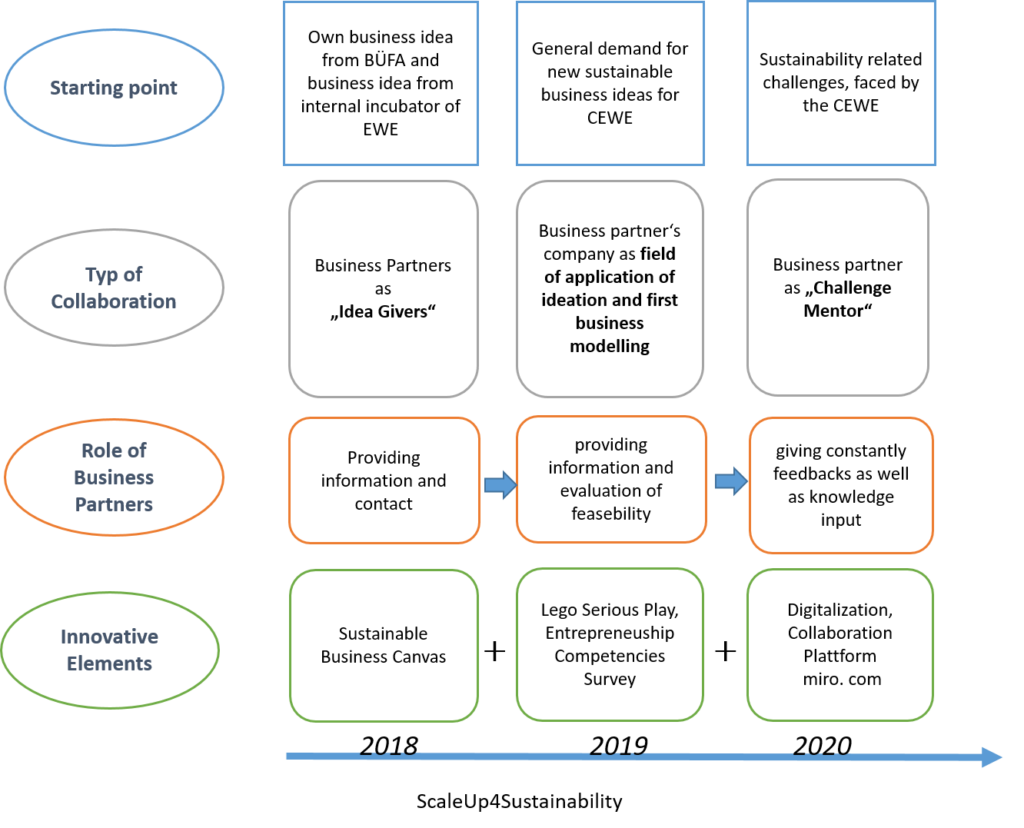Eco-Venturing
A collaborative master project course for sustainable business modelling
Within the module Eco-Venturing, which has been designed in 2009, students develop sustainability-oriented business concepts in cooperation with business partners with the aim of promoting actual business start-ups. Partners with a business idea related to all areas of sustainable business management – this include topics such as renewable energies, renewable raw materials, energy and resource efficiency or climate mitigation or adaptation solutions- are being be supported with implementation by the participating students – a classical win-win situation.
The main target of the "Eco-Venturing" module is to develop entrepreneurial skills for the development and implementation of environmental innovations and sustainable business ideas. These include:
- the ability to identify new solution needs in the context of sustainable development and the sustainable development goals set by the United Nations;
- knowledge and skills for ideation and idea assessment (in terms of Feasibility and Sustainability Impact);
- knowledge and skills for the entrepreneurial development and implementation of innovative solutions;
- knowledge and skills for systematically combining economic (Economical) and ecological (Ecological) objectives and (4) the ability to strategically develop "green" business areas and markets.
Facts & Main Elements
- Revision of Master module, conducted by UOL since 2009
- Implementation of extended version in 2018, 2019, 2020
- 45 students, 4 lecturers and 6 business partners
- 12 business ideas have been developed
What‘s new? / Assessment
- 2019 /2020 Collaboration with just one business partner, but several challenges (CEWE), mentored by various managers from different areas of the company
- 2019 we tested to integrate more ideation tools than before, also Integration of Lego Serious Play for enhancing creativity and idea presentation
- Teaching input from business partner (2020)
- Online-Collaboration Board (miro) for working within project groups and for coaching process
- Introduction of Sustainable Entrepreneurship Competencies Questionnaire in 2019 and 2020
Main outcomes
- High satisfaction among students, business partner and lecturers (in the online version 2020 as well)
- Learning locations outside the university are motivating
- Focus on ideation can create good ideas, but implementation of this ideas by business partners is unlikely: Business ideas of the students in 2019 had been very welcomed at CEWE. In part, they had strengthened already existing considerations within the company, in part they have given new impulses. None of the developed ideas had been implemented.
- Solutions for business challenges of CEWE in 2020 have been more customized, though are not implemented in detail by now.
- Students developed their sustainable entrepreneurship competencies (at most in the area of strategic competences)
- New structure of course plan, detailed playbooks for every session: Facilitates the preparation effort for lecturers
Lessons learned & Plans for Future
- Module will be continued with new elements and new title: Sustainable Venturing
- High interest of business partners to participate
- Need to standardize structures and content on one side and staying flexible and individualize support appropriate to offered challenges on the other
- Challenge-based Learning-approach: forming projects that are challenging for students but doable AND innovative AND of high implementation interest to business partners
- „Expectation management“: defining and documenting the role of business partners and lecturers
- Going ahead with (a) international student competitions ( e.g. European Sustainable Innovation Contest); (b) international exchange of teaching experiences; and (c) collaboration on the Sustainable Venturing Platform.
Enhancement of the module
After 10 years of only few variations of the concept, the project course has been enriched with new innovative elements and the role of the partners has changed from “simply” idea givers to sparring partners and enhancers. Inspired by experiences of our S4S partners an ideation phase was included in the schedule and new teaching approaches - for instance the method Lego Serious Play for ideation and visualization – could have been tested. Since then 45 students, mainly from study programs “Sustainability Economics and Management” but also from study program “Business Administration, Economics and Law”, have taken part.
While since 2009 students were working on brought-in business ideas, they were asked 2019 to find ideas of sustainable products for the company and – after evaluating by the company’s management – to develop Business Models for selected ideas. In the current term, the course is based on dedicated challenges of CEWE. Thereby the company is deeply involved in this course – each project group, who is working on one challenge – is constantly supported by a company’s coach. They provide inside knowledge, give advice during the process and feedback to the final pitches. Nevertheless, not only students learn a lot, the CEWE staff is getting new insights as well. Therefore, Eco-Venturing is a successful example of co-teaching, co-learning and collaboration.

At the end of this term 4 sustainable business models e.g. for using new materials or contributing to a circular economy will have been developed for CEWE. In addition, parts of the three student projects of last term has been implemented in the current product development.
This module goes far ahead a typical case study – more than 10 managers of the company will have been included actively. In this way, also awareness for a sustainable transformation is increasing within an established market player.
More information: Website of the module
More information: prof.dr. Klaus Fichter (klaus.fichter@uni-oldenburg.de)

